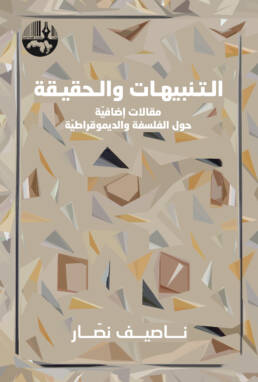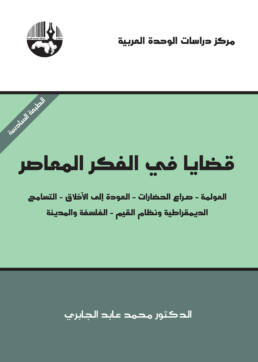The Structure of Arab Reason: The Epistemological Order of Arab Culture
Price range: 8 $ through 16 $
Price range: 8 $ through 13 $
AuthorMohammed Abed Al-JabriDateSeptember 2024No. of Pages599EditionfifteenthISBN978-614-498-047-7E-ISBN978-614-498-149-8
| Weight | 0,885 kg |
|---|---|
| Dimensions | 24 × 17 cm |
| Product Type | Electronic, Paper |
The Center for Arab Unity Studies published the fifteenth edition of the book The Structure of Arab Reason: The Epistemological Order of Arab Culture by Dr. Mohammed Abed al- Jabri.
With the increasing preoccupation with questions and attempts to answer the reasons for the failure of the Arab renaissance, the Arab thinker, Muhammad Abed Al-Jabri, is heading in an unprecedented search for those answers, knocking on the door of the Arab reason in search of factors that hindered the rise of this reason in preparation for the establishment of an actual integrative Arab renaissance project.
Al-Jabri engages in research into the working mechanisms of this reason, its determinants and components, not as an intellectual, theoretical and cognitive storehouse for various issues, topics and problems in which Arab thought has worked since the late nineteenth century at least until today, but rather as a tool for thinking about those issues, and as a tool for the production of knowledge. Thus, it is a tool for reproducing the Arab-Islamic culture, whose elements, trends and contradictions, in turn, contributed to defining the components of this reason at its various levels (knowledge, political and value), providing a critical structural reading, and a comprehensive review of its mechanisms, concepts, perceptions and visions.
Al-Jabri produced this huge foundational intellectual work for the “Criticism of the Arab Reason” in a series of books consisting of four parts, in which the work took more than twenty years. It searched in the formation of the Arab Reason, its structure, the Arab political Reason and the Arab Ethical Reason.
This second part of the “Criticism of the Arab Reason” series deals with the structure of the Arab reason, by conducting a critical analytical study of knowledge systems in the Arab-Islamic culture. Al-Jabri deconstructs the structure of the Arab mind in this part into three fields of knowledge, each with its own world of perceptions, knowledge and approaches, which enters into a relationship of competition and clash with other cognitive worlds. This part also looks at these three fields of knowledge, not through their ideological or metaphysical content, but rather through their cognitive system. Therefore, the book is not concerned with analyzing and comparing ideologies and doctrines of thought, but rather analyzes the foundations on which the process of knowledge acquisition and promotion is based within each of these fields.
Add a review
You must be logged in to post a review.
You May Also Like
Admonitions and Truth: Additional Essays on Philosophy and Democracy
Price range: 10 $ through 13 $
Rhythms on the String of Consciousness
Price range: 6 $ through 10 $
Civilizational Critique of the Arab Society at the End of the 20th Century
Price range: 5 $ through 8 $
We and Our Heritage: Contemporary Readings in Our Philosophical Heritage
Price range: 7 $ through 11 $
Contemporary Arab Discourse: A Critical Analytic Study
Price range: 5 $ through 10 $Issues in Contemporary Thought: Globalization – Civlization Conflict – Return to Ethics – Toleration – Democracy and the Scale of Values – Philosophy and the City
Price range: 4 $ through 6 $
Spiritual Diplomacy and the Abrahamic Interfaith: Colonial Plan of the New Century
Price range: 7 $ through 11 $








